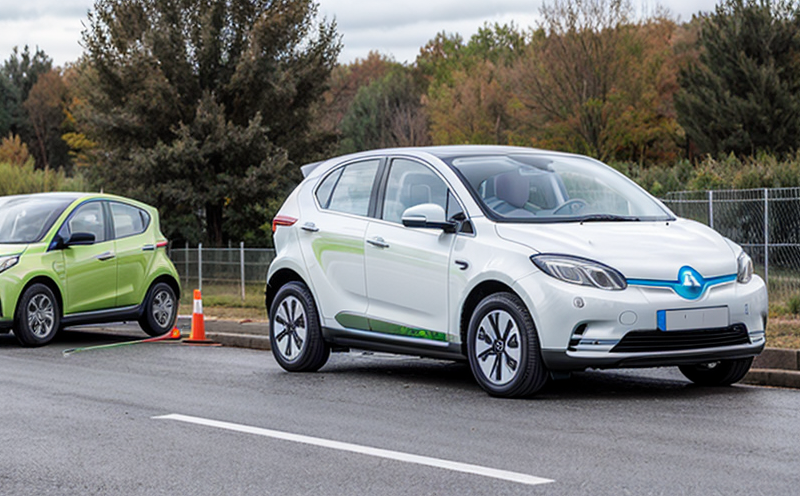DIN EN 62620 EV Large Lithium-Ion Cell Testing
The DIN EN 62620 standard provides a comprehensive framework for testing large lithium-ion cells intended for use in electric vehicles (EVs). This standard ensures that the cells meet stringent safety, performance, and durability requirements. The tests cover critical aspects such as electrical characteristics, thermal stability, mechanical integrity, and abuse conditions to ensure reliability under real-world operational scenarios.
The DIN EN 62620 standard is particularly relevant for large lithium-ion cells due to their unique challenges in terms of safety and performance. These cells are subject to higher stress levels compared to smaller cells used in consumer electronics. Therefore, the tests outlined in this standard are designed to simulate extreme conditions that these cells might encounter during use.
The testing process involves a series of experiments aimed at evaluating various parameters critical for ensuring the safety and reliability of large lithium-ion cells. These include:
The tests are conducted in controlled environments to ensure accurate results. Key parameters measured during these tests include voltage, internal resistance, capacity retention, and thermal runaway behavior. The testing process also involves subjecting the cells to various stress conditions such as overcharging, overdischarging, high-temperature storage, and mechanical abuse.
The results of these tests are crucial for quality managers, compliance officers, R&D engineers, and procurement personnel involved in the development and production of large lithium-ion cells. The data obtained from these tests helps ensure that the products meet regulatory requirements and perform reliably under expected operational conditions.
Testing according to DIN EN 62620 is not only a requirement for compliance but also an essential step in ensuring product safety and performance. By adhering to this standard, manufacturers can reduce the risk of field failures and associated costs while enhancing brand reputation through consistent quality assurance practices.
The detailed nature of these tests makes it imperative that they are performed by experienced laboratories with specialized equipment and expertise. Eurolab, for instance, has a team of highly skilled professionals and state-of-the-art facilities dedicated to conducting such rigorous tests. This ensures accurate, reliable results that can be trusted by all stakeholders involved in the EV industry.
By choosing DIN EN 62620 testing services from Eurolab, organizations can gain valuable insights into their products' performance and safety. These insights are invaluable for continuous improvement efforts aimed at enhancing product quality and reliability.
Scope and Methodology
The scope of DIN EN 62620 testing encompasses a wide range of parameters that are crucial for ensuring the safety, performance, and durability of large lithium-ion cells. The methodology follows stringent international standards to provide accurate and reliable results.
Key components of the test include:
The testing protocol is designed to be stringent enough to identify potential weaknesses in the cells while also being practical for industrial applications. The results of these tests are used by manufacturers to make informed decisions about product design improvements and quality control measures.
Testing according to DIN EN 62620 ensures that large lithium-ion cells meet regulatory requirements and perform reliably under expected operational conditions. This standard is particularly important given the increasing demand for safer, more efficient electric vehicles (EVs) and their batteries.
Eurolab Advantages
DIN EN 62620 EV Large Lithium-Ion Cell Testing is not just about meeting standards; it's about providing superior service tailored to your specific needs. At Eurolab, we offer a range of advantages that set us apart as the preferred choice for this type of testing:
Choosing Eurolab for your DIN EN 62620 EV Large Lithium-Ion Cell Testing needs is a smart decision that aligns with your commitment to safety, performance, and durability in the EV industry.
Competitive Advantage and Market Impact
DIN EN 62620 EV Large Lithium-Ion Cell Testing plays a pivotal role in enhancing competitive advantage and market impact for organizations involved in the development of electric vehicles (EVs) and their batteries. By adhering to this standard, manufacturers can ensure that their products meet stringent safety, performance, and durability requirements.
The tests conducted according to DIN EN 62620 are designed to simulate real-world operational scenarios, ensuring that the cells perform reliably under expected conditions. This is crucial given the increasing demand for safer, more efficient EVs and their batteries.
Organizations that invest in rigorous testing can gain several competitive advantages:
The market impact of adhering to this standard is significant. It not only enhances an organization's reputation but also contributes positively to the overall industry by promoting safer and more reliable EVs and their batteries.





